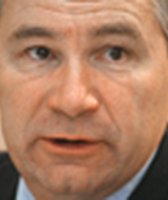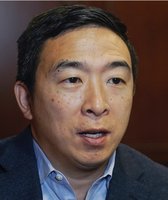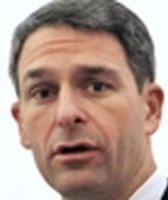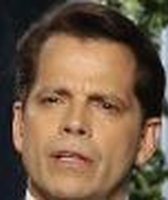Stand up for the facts!
Our only agenda is to publish the truth so you can be an informed participant in democracy.
We need your help.
I would like to contribute
President Donald Trump trained his fire on the memos of former FBI Director James Comey, claiming the written impressions of their one-on-one discussions contain classified information and that Comey broke the law by disclosing them.
Comey is crisscrossing the country to promote his memoir A Higher Loyalty, which paints Trump in a harsh light.
"James Comey’s Memos are Classified, I did not Declassify them," Trump tweeted April 21. "They belong to our Government! Therefore, he broke the law!"
James Comey’s Memos are Classified, I did not Declassify them. They belong to our Government! Therefore, he broke the law! Additionally, he totally made up many of the things he said I said, and he is already a proven liar and leaker. Where are Memos on Clinton, Lynch & others?
— Donald J. Trump (@realDonaldTrump) April 21, 2018
The issue of classification is far murkier than Trump makes it seem. Here’s what we know, what’s been reported and what remains unclear about the Comey memos. Due to major gaps in the public reporting, we will not put Trump’s statement on the Truth-O-Meter for now.
Comey made detailed notes immediately following seven encounters with Trump. The memos began after a Jan. 6, 2017, Trump Tower meeting, and ran through April 11, 2017, less than a month before Trump removed as Comey as FBI director.
While Comey had previously testified before Congress about portions of the memos, they became public in their entirety for the first time on April 19, 2018, after the Justice Department gave redacted versions to Congress.
Of the seven memos, four now bear classification markings: two are marked "confidential" — the lowest classification level — and two are marked "secret." A Washington Post analysis noted the classification appears to have been made by a top official in the FBI’s Counterintelligence Division, though it’s not clear when.
Before the memos became public, Comey shared at least some of his written impressions with Daniel Richman, a law professor at Columbia University who also advises Comey. In a 2017 interview, Richman said he received four Comey memos. (Richman did not respond to a request for comment.)
According to the Wall Street Journal, at least two of the four memos Comey shared with Richman contained information that is now considered classified. However, details are sketchy about which memos Comey gave Richman, and how sensitive their contents were at the time of transfer. (Citing anonymous sources, the Journal said Comey redacted elements from one memo that he knew were classified before sharing, and that another memo was classified only after Comey left the FBI.)
The former FBI director has acknowledged that he asked Richman to share the contents of a Feb. 14, 2017, memo with the New York Times. (That memo is not marked classified.)
"I told him I was going to send him one unclassified memo and I wanted him to share the substance of the memo — but not the memo itself — with a reporter," Comey wrote in his memoir.
This resulted in a May 2017 New York Times article that described a private conversation between Trump and Comey at the White House about former national security adviser Michael Flynn. The Times article — reflecting Comey’s Feb. 14, 2017, memo — describes Trump asking Comey to drop the investigation into Flynn, saying, "I hope you can see your way clear to letting this go."
When we wrote about Comey’s leak of the Feb. 14 memo, several legal experts told us he likely did not run afoul of the law. But the picture is now somewhat fuzzier with the release of all seven memos.
The Journal wrote that the Justice Department Inspector General "is now conducting an investigation into classification issues related to the Comey memos." The Justice Department declined to comment for this article, and we do not rely on anonymous sources.
Big gaps in the public reporting on Comey’s memos — as well as other complicating factors — makes this a difficult case to predict. It’s unclear whether these written impressions contained classified information, or when the information was deemed classified.
An Obama-era executive order lays out the standards for classifying information. Under the rule, information should be classified if releasing it to the public could be expected to damage national security, either by revealing military plans, foreign government information, sources and methods or some other highly-sensitive subject matter.
Timothy Edgar, a senior fellow at Brown University’s Watson Institute and a former national security and intelligence official, said the government’s tendency to hew toward secrecy means it’s possible none of Comey’s memos have been properly classified in the first place.
"We don't really know if any of the information in the Comey memos met this standard," Edgar said. "Over-classification is a huge problem, so it wouldn't surprise me at all if none of it was properly classified."
Comey’s role as FBI director at the time he penned the memos adds another wrinkle to the analysis. In that role, Comey was considered an "original classification authority," which means he was authorized to determine whether his memos were classified.
"The classification authority at the FBI lies with the director, who can delegate that authority to others," said Peter M. Shane, a law professor at Ohio State University. "But Comey's memos would not have been classified unless he himself classified them."
One objection to this argument could be that such a decision should not have been made without consulting the White House counsel, Edgar said. As we reported, Trump attorney Jay Sekulow has argued that Comey’s decision was "unprecedented" and that Comey did not give the Trump administration an opportunity to determine if they would invoke executive privilege over the memos.
According to Edgar, the broadest law to punish leakers of classified information is the Espionage Act. But a prosecutor would have a hard time convicting Comey of violating this law, he said.
"Not all leaks of classified information are criminal," Edgar said. "It only applies to ‘national defense information’ — which these memos probably do not contain — and, even then, requires proof that the disclosure was made ‘to the advantage of a foreign nation.’ That’s a standard that is unlikely to be met here."
Separately, federal law bans the disclosure of classified information. In an ironic twist, the same statute that governed the investigation into Hillary Clinton’s use of a private email server while secretary of state — and which Comey announced Clinton had not violated — could be relevant in Comey’s case.
"As Director Comey himself has explained, the key issue there will likely be one of intent," Edgar said. "You would need something like a ‘smoking gun’ that shows Comey knows that he is sharing classified information improperly and is doing so on purpose without regard to the rules."
But Lisa Kern Griffin, a law professor at Duke University, said it is highly unlikely Comey knowingly and willfully leaked classified information.
"We do know that the memo that Richman shared with the New York Times was not classified," Griffin said. "The status of the other three memos is less certain, but it does not appear that any material coded as ‘classified’ at the time was included in the transfer."
Even if Comey faces no criminal charges, it is possible Comey would face administrative sanctions if he’s found to have disclosed classified information, Edgar said. He added that ordinarily such a case would not be pursued given Comey has already been fired.
"I'm not sure if a violation could affect Comey's pension, although I think it could," Edgar said. "It certainly could affect his ability to get a clearance in the future."
Aside from the classification issue, Comey could face liability for theft of government property if he in fact gave Richman the memos themselves, Edgar said.
"Comey's best defense would be that, as the head of the agency, he has wide discretion to share information with people outside the FBI in order to obtain advice, so sharing documents for such purposes is not theft or conversion," Edgar said.
Our Sources
Tweet by Donald Trump, April 21, 2018
18 U.S. Code § 798 - Disclosure of classified information
Wall Street Journal, "Justice Department Watchdog Probes Comey Memos Over Classified Information," April 20, 2018
New York Times, "Comey Memo Says Trump Asked Him to End Flynn Investigation," May 16, 2017
PolitiFact, "Donald Trump: Comey's leak of memo 'totally illegal?' " June 11, 2017
Washington Post, "Comey, the memos and the question of what’s classified," April 23, 2018
Fox News, "Comey memos reportedly had classified info; Trump says ‘That is so illegal,’ " July 10, 2017
Buzzfeed, "Attorney General Jeff Sessions Sat Down With Special Counsel Mueller's Office," Jan. 23, 2018
Email interview with Timothy Edgar, a senior fellow at Brown University’s Watson Institute and a former national security and intelligence official, April 23, 2018
Email interview with Lisa Kern Griffin, Duke University School of Law, April 23, 2018
Email interview with Peter M. Shane, a law professor at Ohio State University, April 23, 2018


















































